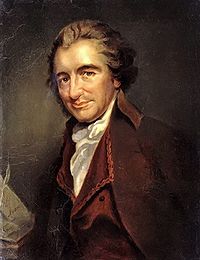
Agrarian Justice
Encyclopedia

Pamphlet
A pamphlet is an unbound booklet . It may consist of a single sheet of paper that is printed on both sides and folded in half, in thirds, or in fourths , or it may consist of a few pages that are folded in half and saddle stapled at the crease to make a simple book...
written by Thomas Paine
Thomas Paine
Thomas "Tom" Paine was an English author, pamphleteer, radical, inventor, intellectual, revolutionary, and one of the Founding Fathers of the United States...
, published in 1797, which advocated the use of an estate tax and a tax on land values
Land value tax
A land value tax is a levy on the unimproved value of land. It is an ad valorem tax on land that disregards the value of buildings, personal property and other improvements...
to fund a universal old-age and disability pension, as well as a fixed sum to be paid to all citizens on reaching maturity. This is similar to the later philosophy of Georgism
Georgism
Georgism is an economic philosophy and ideology that holds that people own what they create, but that things found in nature, most importantly land, belong equally to all...
.
It was written in the winter of 1795-96, but remained unpublished for a year, Paine being undecided whether or not it would be best to wait until the end of the ongoing war with France
First Coalition
The War of the First Coalition was the first major effort of multiple European monarchies to contain Revolutionary France. France declared war on the Habsburg monarchy of Austria on 20 April 1792, and the Kingdom of Prussia joined the Austrian side a few weeks later.These powers initiated a series...
before publishing. However, having read a sermon by Richard Watson
Richard Watson (bishop)
Rt Rev Richard Watson was an Anglican clergyman and academic, who served as the Bishop of Llandaff from 1782 to 1816. He wrote some notable political pamphlets....
, the Bishop of Llandaff
Bishop of Llandaff
The Bishop of Llandaff is the Ordinary of the Church in Wales Diocese of Llandaff.-Area of authority:The diocese covers most of the County of Glamorgan. The Bishop's seat is located in the Cathedral Church of Saint Peter and Saint Paul , in the village of Llandaff, just north-west of the City of...
, which discussed the "Wisdom ... of God, in having made both Rich and Poor", he felt the need to publish, under the argument that "rich" and "poor" were arbitrary divisions, not divinely created ones.
Proposed system
Paine proposed a detailed plan to tax property owners to pay for the needs of the poor, which could be considered as the precursor of the modern idea of citizen's incomeCitizen's dividend
Citizen's dividend or citizen's income is a proposed state policy based upon the principle that the natural world is the common property of all persons . It is proposed that all citizens receive regular payments from revenue raised by the state through leasing or selling natural resources for...
or basic income
Basic income
A basic income guarantee is a proposed system of social security, that regularly provides each citizen with a sum of money. In contrast to income redistribution between nations themselves, the phrase basic income defines payments to individuals rather than households, groups, or nations, in order...
. The money would be raised by taxing all direct inheritances at 10%, and "indirect" inheritances - those not going to close relations - at a somewhat higher rate; this would, he estimated, raise around £5,700,000 per year in England.
Around two-thirds of the fund would be spent on pension payments of £10 per year to every person over the age of fifty, which Paine had taken as his average adult life expectancy, with most of the remainder allocated to making fixed payments of £15 to every man and woman on reaching the age of twenty-one, legal majority. The small remainder would then be able to be used for paying pensions to "the lame and blind". For context, the average weekly wage of an agricultural labourer was around 9 shillings, which would mean an annual income of about £23 for an able-bodied man working throughout the year.
Philosophical background
The work is based on the contention that in the state of nature, "the earth, in its natural uncultivated state... was the common property of the human race"; the concept of private ownership arose as a necessary result of the development of agricultureAgriculture
Agriculture is the cultivation of animals, plants, fungi and other life forms for food, fiber, and other products used to sustain life. Agriculture was the key implement in the rise of sedentary human civilization, whereby farming of domesticated species created food surpluses that nurtured the...
, since it was impossible to distinguish the possession of improvements to the land from the possession of the land itself. Thus Paine views private property as necessary, but that the basic needs of all humanity must be provided for by those with property, who have originally taken it from the general public. This in some sense is their "payment" to non-property holders for the right to hold private property.

